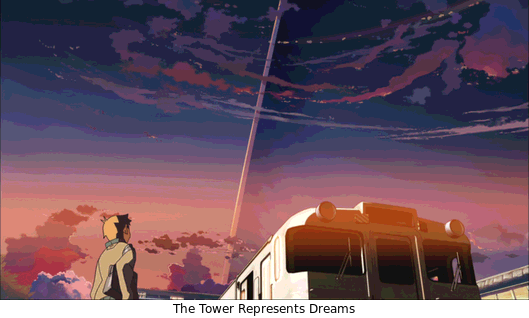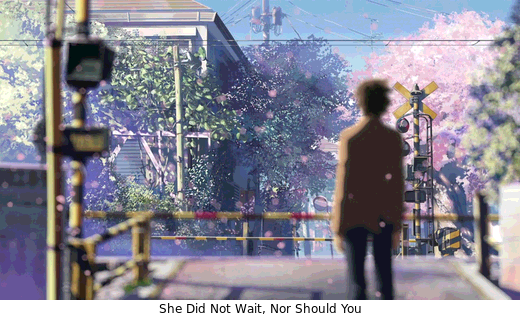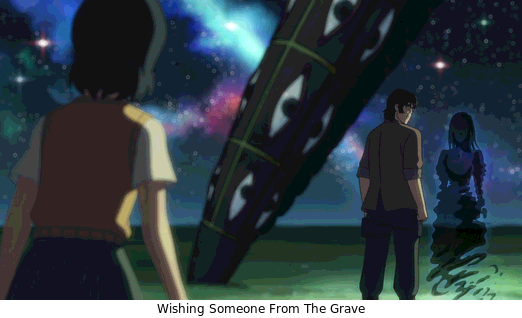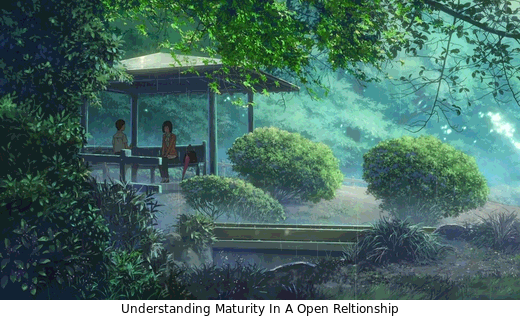UPDATE 2017-01-20: Refactoring from ghosts to time travel, a logical error. Also, making it more brief than longwinded.
Kimi no Na wa
Kimi no Na wa has no obvious message about an aspect of relationships.
Kimi no Na wa (2016) is one of Makoto Shinkai's beautiful work. It is visually magnificent, spectacularly directed and romantically moving. Praises and adulation, nothing less from his works and I would love to rewatch it. After noting how great it is from a viewing experience, I now want to talk about what it means to me.
As a fan of his previous films, what I look for in his works are both beauty and meaning. After watching his films, I am lost in thought and emotion, asking for closure and meaning. However, I am not assuming you have seen his previous films, rather I will give my own interpretations and contrast it with this film.
SPOILER WARNING for this this and his previous films.
Present
This film is a romantic story based on a body swapping mechanic. Not unique but the presentation of the relationship and cinematic execution is what makes this standout. And that Shinkai touch.
In the lens of a three part act, the first act introduces their relationship brought about by the body swapping, the second act stops the swappingg and brings much needed mechanical exposition, the last act is the meeting of time and space. To elaborate the mechanic, the girl exists in a time three years before the boy and swap time and place every other day. The reason for it might be due to the magic of the circling comet and the hint that the boy's family itself might be time travellers. The actual mechanic itself is a little strange that I believe ghosts and out-of-body experiences served a more believable explanation than time travel. Regardless of errors in actual reasoning, my sentiment and thoughts are valid.
So on my initial viewing, I stayed behind until the credits rolled because I could not think how it failed to ask questions about aspects of a relationship. I make this statement on the basis of asking if the main characters meeting has meaning aside from closure or catharsis. I find it hard to believe that this film is has nothing to say aside from having a nice teenage romance, which is not wrong but strange.
Looking For Meaning
A film may or may not have meaning or message. A film may be for a casual or artistic experience, so it is not required. My case is that after watching so many films, I want to find and watch films that are more than enjoyment. Although I do have moods in watching, I can only watch so many that I have to choose those with literal meaning and value.
My general claim is that if a film has a message, it has more value than a film that doesn't. The judge is primarily execution and context, a bad film can have a message and a good film can have none. As a cerebral watcher, it is the message or themes that resonate and stays with me after the film rather than the emotional punch at the end. I am merely maximizing my time in watching, but it's good to have fun as well.
I understand that there are pretentious films and that this is my personal gripe but I had my expectations for a Shinkai film: beautiful inside and out. If you want to understand my expectations, let's look at what his previous films said.
Past
Here is a list of his previous work with my quick interpretations:
- The Place Promised in Our Early Days (2004)
- Reality is more important than dreams
- 5 Centimeters Per Second (2007)
- Moving on from your past
- Children Who Chase Lost Voices (2011)
- Accepting grief and sadness
- The Garden of Words (2013)
- Being mature
These may not be perfect interpretations but at least I had one for each of them. Each one deserves a post looking at there theme and message but for now I will justify my interpretations about each one to avoiding making this longwinded. Read on with a grain of salt.
The Place Promised in Our Early Days
Reality is more important than dreams

This film is more complicated mechanically than the main film since it uses parallel worlds and scientific babble. Plotholes and complexities, there is a tower reaching the heavens which unites everyone in hope and dream, to reach the heavenly tower. For some reason, this tower took the main girl into itself and where the main boy gets into a chopper, gets the girl inside and destroys the tower. A little more complex than it has to be to present a romantic story.
It took me quite a while to come to terms with this film and the easiest explanation I can give is this: the tower represents dreams and by destroying and getting the girl, reality is not as important. Put in another way, instead of dreaming of being together, let us be together.
To add to this, there is a war where two countries are struggling and between them is the tower. A resistance force wants to unify the two by destroying it thereby removing the towering distance between them.
More directly, the girl inside the tower and the boy outside dreams to be together. The tower is their promised place but by destroying it to free the girl, they have literally destroyed their paradise to be together.
The tower represents that place in the distance that people can dream and share together, thus the symbolic ending is disheartening. Is it wrong to dream and live in that paradise?
It is a complicated film but it has a message, although not something I endorse. In comparison to this theme and setup, I would prefer to watch Royal Space Force: The Wings of Honeeamise as the simple symbolism of an everyday man of dreaming to launch to space is much more triumphant.
5 Centimeters Per Second
Moving on from things that cannot be

This film is the reason why I am a Shinkai fan. It is a literal three-part structure represented by short stories, the first part shows the relationship between the leads, the second piece the distant growing between them, the last indicates how far they are. From the outset, I praise this film for showing how people get distant over time, a rare topic to cover. Although the film appears to be a sad, it is actually a happy one by showing the main protagonist moving on.
Here the relationship has meaning. Although the can get close physically, they are worlds apart. During their separation, the woman has found a life while the man is longing for her too much. If they did hook up, it would simply be a tale in fate and destiny. However, by choosing to move on, it shows acceptance of things that cannot be. No matter how close they get, they are worlds apart despite how they dream of those early days.
This is a subversion on the romantic ending and relationship that is well executed in tackling isolation and longing in a simple and realistic relationship. This is the essential Shinkai film in my eyes from which others are judged. Moving on.
Children Who Chase Lost Voices
Understanding and moving on from grief

This film is standout from the roster. First, the message is very easy to understand, accepting grief. Nothing much to say or do with its simplicity but not that it is bad. If you consider grief as longing, then it is a reasonable theme for a Shinkai film.
Secondly, this has a magical world much more akin to a Studio Ghibli film. Perhaps from social pressure of being a Miyazaki which is not needed as with Mamoru Hosoda? Not that I discourage it, he already has a distinct style that I appreciate.
Lastly, the film has no romantic relationship to address, instead the question is changed to should they call for their dearly departed? The least Shinkai film.
This film is not a masterpiece of story telling or world building but it does address grief on a journey to the other world simply.
Garden Of Words
Being mature is not being an aduly but a person maturing.

My second favorite Shinkai film while being a return to form from the previous one. It presents a relationship between a high schooler and a teacher in a way that puts them on equal footing. Their meetings on rainy morning in a park is an escapist paradise, where people who can be isolated from their fear. Through their meetings, they grow a relationship that transcend status and responsibility. It is a true Shinkai film.
At some point in the film, the illusion is shattered and their relationship meets up with reality. Questioning both the maturity of the student and the responsibility of the teacher. What makes this different is that it ends on an open ending. By using such, the relationship is allowed a new start when both are more mature in their lives, instead of forcing an issue of age, status and responsibility.
Among his previous films, this is the most complex in terms of understanding which I appreciate. A similar theme is done by FLCL but I prefer this for how much you have to look and think about the meaning of their relationship.
The Meaining In Their Relationship
What does it mean for the characters to be in a relationship?
So the previous films have clearly a message about an aspect of relationship. Whether is it dreams, grief, maturity or distance, the main relationship has a question to answer. Coming back to the main film, what does it mean for the main characters to be in a relationship?
If they meet up, it merely means fate and destiny; if they did not, do not mess with time travel. For the life of me, I cannot think of a deeper meaning to the film aside from the body swapping mechanics. Sitting in that theatre, I felt disappointed intellectually.
In retrospect, this film is unique in that regard. Just being a solid teenage romance story but it feels hollow. For me, I watch Shinkai film because it has meaning, something most films can't give me.
Conclusion
Again, this is just my personal gripe, but I am marking this film. If we take Hideo Kojima's elegant but hollow Metal Gear 5: The Phantom Pain or the wonderful but decaying series Spongebob as examples, these are reminders of being a fan.
Anyhow, it is still a commercial success so I hope that funds a more meaningful film. I still recommend this film but it falls at the last place. I would strongly suggest 5 Centimeters Per Second or The Garden of Words as the go-to Shinkai films.